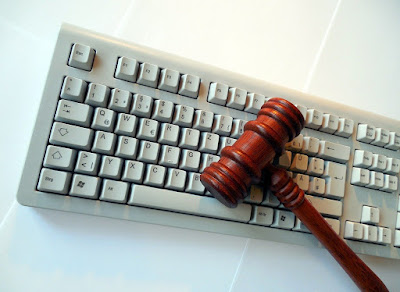E-Trials & Virtual Courtrooms: A possible solution to Court Lockdown
Editor: Anastasios Tsanakas, Lawyer
 Numerous Jurisdictions, including the Republic
of Cyprus have decided as part of their measures for the prevention of Covid 19
transmission, the suspension of Court operations. Nevertheless and for obvious
reasons there can be no universal lockdown to the administration of justice.
Numerous Jurisdictions, including the Republic
of Cyprus have decided as part of their measures for the prevention of Covid 19
transmission, the suspension of Court operations. Nevertheless and for obvious
reasons there can be no universal lockdown to the administration of justice.
A possible solution to the imposed restrictions
that inhibit justice accessibility is the development and establishment of
“e-trials”.
In the UK, an entire trial is being conducted
over Skype in a legal first that lawyers say could be a model way to ensure
court business continues during the Covid-19 pandemic.
The Judge, is asked to decide whether it is in
the best interests of a 70 years old man that suffered a major stroke in 2016
to have the clinically assisted nutrition and hydration he receives through a
tube, withdrawn. The patient’s daughter and GP disagree over his treatment and
the local clinical commissioning group has asked the court to determine the
course to take.
In the three-day hearing, the judge, lawyers,
11 witnesses, three experts and two journalists, joined the hearing online
through Skype for Business, which enables everyone to see and hear those taking
part, as well as allowing the hearing to be recorded. The judge decided that
the hearing should be conducted over Skype to enable it to proceed without
risking the health of any of the participants, some of whom are in vulnerable
groups or live with people who are.
At the end of the first day, the barrister
representing the man’s GP, stated: ‘It was very effective, and allowed for full and
fair participation by all parties, using a laptop from their home or office’.
And continued: ‘It’s a necessary step – it’s important for the rule of law to ensure the
courts continue to function during this crisis.’ In similar terms
the barrister representing the clinical commissioning group stated: ‘It could be
used as a model to keep the system going, keep justice accessible and to
alleviate the anxiety of parties who otherwise might have to wait a long time
for hearings to take place in court.’
Sharing the above view, the lord chief justice
said that both the civil and family courts could move to telephone and video
hearings. ‘Any legal impediments will be dealt with.’ On the
criminal courts, he said: ‘Particular problems are likely to be encountered
in both the magistrates’ courts and the Crown courts, to which careful thought
is being given.’
The ”e-trial” proposal seems to gain momentum
during the Covid-19 pandemic. Another case, this time a multi-party commercial
trial relating to over $500m, could be heard entirely online and streamed on
YouTube as a result of the coronavirus lockdown.
The ‘substantial multi-party litigation’ was
originally scheduled to last seven days in London’s commercial court and
numerous factual and foreign law expert witnesses were due to be called before
travel restrictions were imposed.
The case will now be heard remotely, with
preparations being made to allow barristers, solicitors and the judge to work
from home. The judge gave short shrift to the argument that there would likely
be insurmountable logistical and technical difficulties and concluded that the
court must adopt an ‘optimistic, rather than a pessimistic, attitude’.
In addition, he acknowledged the possibility
that technical issues may arise, and that counsel may contract the virus and be
unable to appear for a number of days. Nonetheless, he said that a remote
hearing should be arranged, and that these risks should be addressed if and
when they materialise.
Parties have agreed to set up a ‘virtual court
room’ in the form of a video conference in which participants can see and hear
each other. They are also organising ‘virtual Post-it notes’ and ‘virtual
break-out rooms’ to allow legal teams and clients to discuss the trial as it
proceeds. The trial will be recorded and streamed, potentially via YouTube, so
that journalists and members of the public can follow the proceedings.
The above cases illustrate that the approach in
favor of “e-trials” seems to become widely accepted especially where there can
be no solid estimation on the duration of the suspension of Court operations.
Of course, several technical problems will be faced but advanced technological
applications and the unparallel need for administration of justice dictate that
every effective alternative solution must be seriously taken into account. (photo:pixabay)
_____________________






Wow! A sure sign of the times! Thanks for the article!
ReplyDeleteThe BBB has a dispute resolution process which permits BBB businesses and their customers to resolve disputes by arbitration or mediation. You don't need a lawyer and the only cost is a small administration fee. More information about this process is available on the BBB website. Product liability lawyer in Miami
ReplyDelete